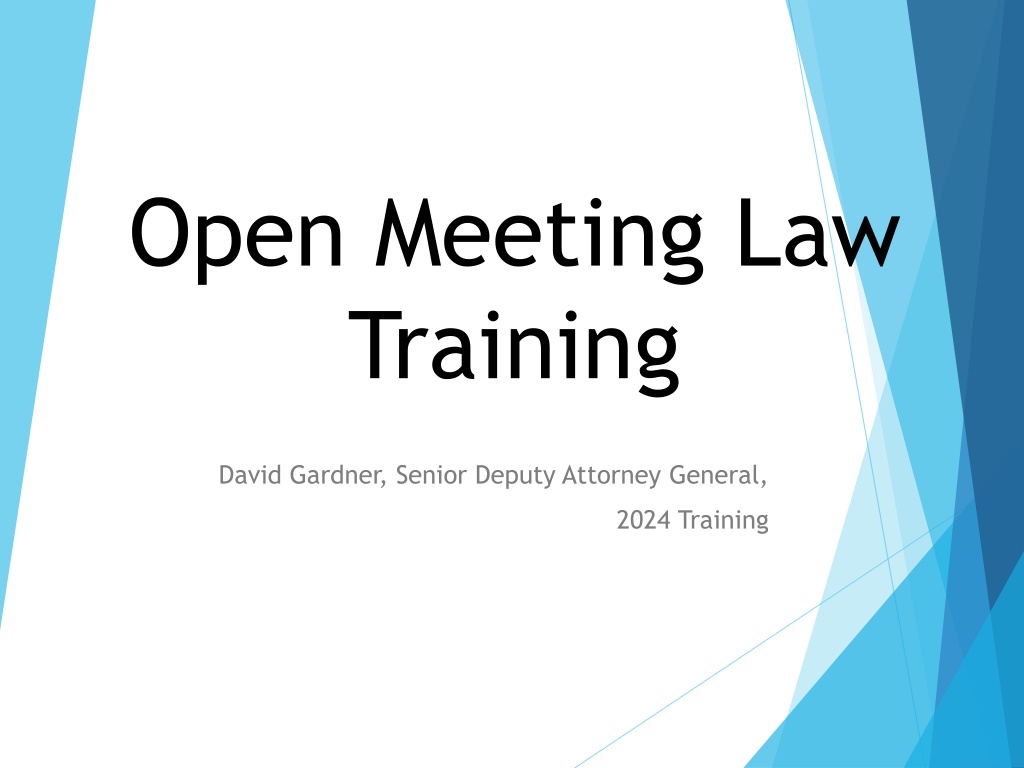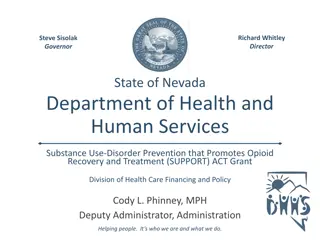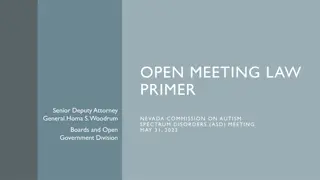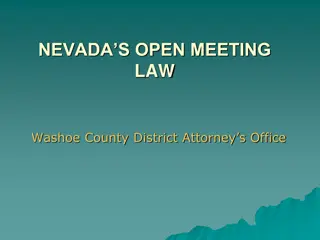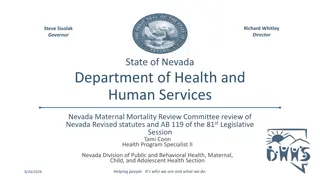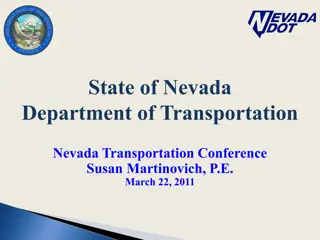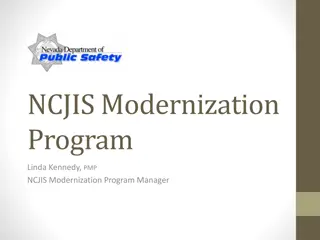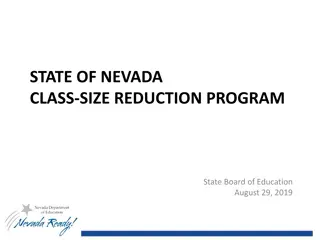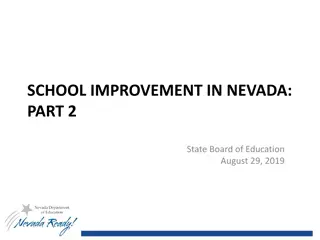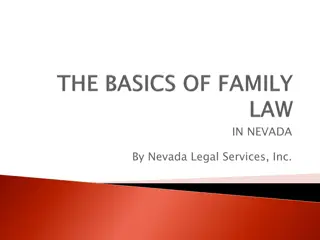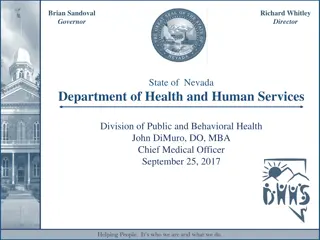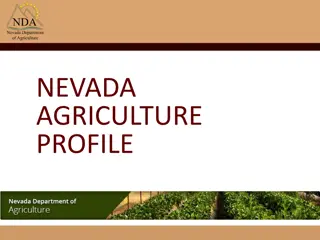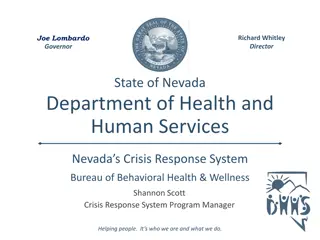Understanding Nevada's Open Meeting Law
Nevada's Open Meeting Law mandates that public bodies conduct meetings openly to aid in the people's business. The law requires meetings to be public, transparent, and accessible, whether in person or via remote technology systems. It also defines what constitutes a public body and outlines the applicability of the law to various organizations. Additionally, the law emphasizes the importance of promoting openness in government and ensuring that deliberations and actions are conducted in a transparent manner.
Download Presentation

Please find below an Image/Link to download the presentation.
The content on the website is provided AS IS for your information and personal use only. It may not be sold, licensed, or shared on other websites without obtaining consent from the author. Download presentation by click this link. If you encounter any issues during the download, it is possible that the publisher has removed the file from their server.
E N D
Presentation Transcript
Open Meeting Law Training David Gardner, Senior Deputy Attorney General, 2024 Training
Legislative Intent In exacting this chapter, the Legislature finds and declares that all public bodies exist to aid in the conduct of the people s business. It is the intent of the law that their actions be taken openly and that their deliberations be conducted openly. NRS 241.010. The exceptions provided to this chapter, and a remote technology system or electronic communication, must not be used to circumvent the spirit or letter of this chapter to deliberate or act, outside of an open and public meeting, upon a matter over which the public body has supervision, control, jurisdiction or advisory powers. NRS 241.016(4). A statute promulgated for the public benefit such as a public meeting law should be liberally construed and broadly interpreted to promote openness in government. Dewey v. Redevelopment Agency of Reno 119 Nev. 87, 94, 64 P.3d 1070, 1075 (2003)
Applicability of the Open Meeting Law All meetings of public bodies must be open and public, and all persons must be permitted to attend any meeting of these public bodies at a physical location or by means of a remote technology system. NRS 241.020(1) Administrative, legislative, and executive organizations may all be public bodies. (the Legislature is not-NRS 241.016(2)(a)) Public bodies working on behalf of Nevada citizens must conduct open meetings in conformity with the statutory requirements of the OML including the requirement to publish an agenda that provides full notice and disclosure of discussion topics and any possible action. Includes subcommittees created by public bodies. NRS 241.015(5)(d).
What is a Public Body? NRS 241.015(5)(a): Any administrative, advisory, executive or legislative body of the State or a local government Consisting of 2 or more people, Expends or disburses or is supported in whole or in part by tax revenue, or makes recommendations to any entity which expends or disburses or is supported in whole or in part by tax revenue, Make collective decisions or recommendations (staff meetings within an agency or interagency meetings with no independent legal authority, budget, and formal mission or purpose will not fall within the definition of a public body) OMLO 2004-04 Created by the Constitution, statute, city charter, The Nevada Administrative Code, an executive order from the Governor, resolution or formal action from a body created by statue or local ordinance or a resolution or action by a political subdivision
What is a Meeting? NRS 241.015(4) says: Quorum of members of a public body gathering together with: Deliberation toward a decision; and/or Action: which means making a decision, commitment or promise over a matter within the public body s supervision, jurisdiction, control or advisory power. A quorum is a simple majority of the total body NRS 241.015(6); action requires majority vote of members present NRS 241.015(1). Quorum + (Deliberation or Action) = Meeting
Common Issues Serial communications or walking quorums can constitute a constructive meeting. A constructive quorum can exist with less than a quorum speaking together at any given time if opinions are relayed between members. Email pitfalls Reply all email chains can constitute a meeting. Example of a constructive quorum: Two members of a five member public body discuss how they intend to vote on an issue and why. One of those members then has that same discussion with a third member, including how both the first two members intend to vote and why. A quorum (three members) has deliberated on an issue outside of a meeting. Members going beyond the agenda description of an agenda item or discussing non-agendized items, including responding to public comments.
Key Requirements AGENDA: Must provide full notice and disclosure of discussion topics and any possible action. NRS 241.020(3)(d)(1). DECISIONS: Deliberation and action must be properly noticed and taken openly. NRS 241.020(3)(d)(2). PUBLIC COMMENT: at beginning/end or before any action item. NRS 241.020(3)(d)(3). MATERIALS: Supporting materials must be available to the public when provided to public body members. NRS 241.020(8). MINUTES: Minutes must be approved within 45 days or at the next meeting, whichever occurs later. NRS 241.035(1). FACILITIES: Must make reasonable efforts to ensure that the facilities are large enough to accommodate the anticipated number of attendees. NRS 241.020(2).
What is Clear and Complete? Agenda items must be clear and complete. NRS 241.020(3)(d)(1). A higher degree of specificity is necessary for topics of substantial public interest. Sandoval v. Bd. Of Regents of Univ., 119 Nev. 148, 154-55, 67 P.3d 902, 906 (2003). Factors to consider include: Does the topic generate public comment? Does the topic generate debate among the members of the body? Does the topic generate media interest/coverage? Agenda items such as member comments and reports are problematic in that these invite discussion and possible deliberation on topics that are not set forth on the agenda. Any topic that is raised should be included on a future agenda before any discussion can ensue. Also, issues brought up during public comment cannot be discussed until agendized at a future meeting.
Public Comment Restrictions Restrictions must be reasonable time, place, and manner restrictions and placed on the agenda. NRS 241.020(3)(d)(7). This means NO: Halting comment based on viewpoint of speaker; Halting comment critical of a public official; or Unnecessary restrictions such as requiring the public to sign up hours before the meeting. But, presiding officer may halt comments that are willfully disruptive by being irrelevant, repetitious, slanderous, offensive, inflammatory, irrational or amounting to personal attacks or interfering with the rights of other speakers, or that stray from the scope of a specified agenda topic for which comment is offered. The presiding officer may also halt conduct that is willfully disruptive. The OML does not [p]revent the removal of any person who willfully disrupts a meeting to the extent that its orderly conduct is made impractical. NRS 241.030(4)(a).
Remote Technology Systems Remote technology system means any system or other means of communication which uses any electronic, digital or other similar technology to enable a person from a remote location to attend, participate, vote or take any other action in a meeting, even though the person is not physically present at the meeting. The term includes, without limitation, teleconference and videoconference systems. NRS 241.015(6). If used: A physical location can be used, but is not necessary if the members of the public body are not elected. NRS 241.023(2). All the members of the public body and the members of the public must be able to hear and observe the meeting, participate in the meeting, and provide live public comment. NRS 241.023(1)(b). The public body may also allow public comment by means of prerecorded messages also. NRS 241.023(1)(b)(2). Supporting material must be uploaded to the website for the public body. NRS 241.020(11).
Exceptions Closed sessions may be held by any public body to consider: Character; Alleged misconduct; Professional competence; Physical or mental health of a person NRS 241.030. An emergency meeting may only be called to address truly unforeseen circumstance. Disasters and health/safety emergencies. NRS 241.020(12). Non-Meeting NRS 241.015(4)(b) and (c). Social functions if the members do not deliberate toward a decision or take action on any matter over which the public body has jurisdiction. To receive information from the attorney employed or retained by the public body regarding potential or existing litigation involving a matter over which the public body has jurisdiction and to deliberate toward a decision on the matter, or both. Training as long as there is no deliberation or action on any matter within the public body s jurisdiction and control. Pre-meeting discussion to remove or delay discussion of items from agenda.
Violations Actions taken in violation of the law are void. NRS 241.036. The OAG has statutory enforcement powers under the OML and the authority to investigate and prosecute violations of the OML. NRS 241.037; NRS 241.039; NRS 241.040. The OAG has subpoena authority to investigate from NRS 241.039. The OAG typically will not investigate complaints regarding alleged violations which occurred more than 120 days before. The OAG may decline to investigate if it determined that the interests of the complainant are not significantly affected by the alleged violation with some exceptions. NRS 241.039(3). When a violation of the OML occurs or is alleged, the OAG recommends that the public body make every effort to promptly correct the apparent violation. NRS 241.0365. But corrective action is prospective only. NRS 241.0365(5).
Violations Cont. Any person denied a right conferred by this chapter may sue to have an action declared void, to require compliance with or prevent violations of this chapter. The court may order payment of reasonable attorney's fees and court costs to a successful plaintiff in a suit brought under this subsection. NRS 241.037(2). Criminal and Civil Penalties may apply if violation is knowing. NRS 241.040. If a member of the public body relies on legal advice, no criminal penalty or administrative fine may be imposed. NRS 241.040(6).
2023 Legislative Session Updates Public bodies cannot hold regulation hearings virtually. There must be a physical location. AB 219 For virtual meetings, the agenda must include clear and complete instructions on how to call in for public comment. The instructions need to be read before the first public comment period. AB 219 When there is a multi-day public meeting, public comment must be taken each day. AB 219 In general, when considering quorum, public bodies can exclude vacancies when calculating whether quorum is met. AB 52 In general, only voting members are considered when calculating quorum. AB 52
Further Resources OAG s Open Meeting Law Manual(12thed., Updated March 2019) Statutory provisions Explanation of requirements Examples Compliance checklists Sample Forms: agenda, minutes and notice of meeting to consider a person s character, etc. Available on the Attorney General s website at: http://ag.nv.gov/About/Governmental_Affairs/OML/
Q & A My Contact Information: David Gardner Senior Deputy Attorney General Telephone (702) 486-5714 dgardner@ag.nv.gov
